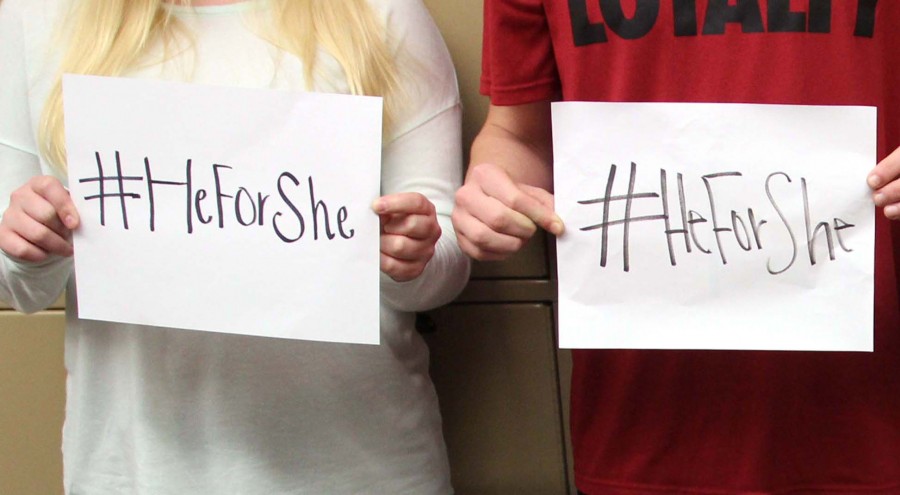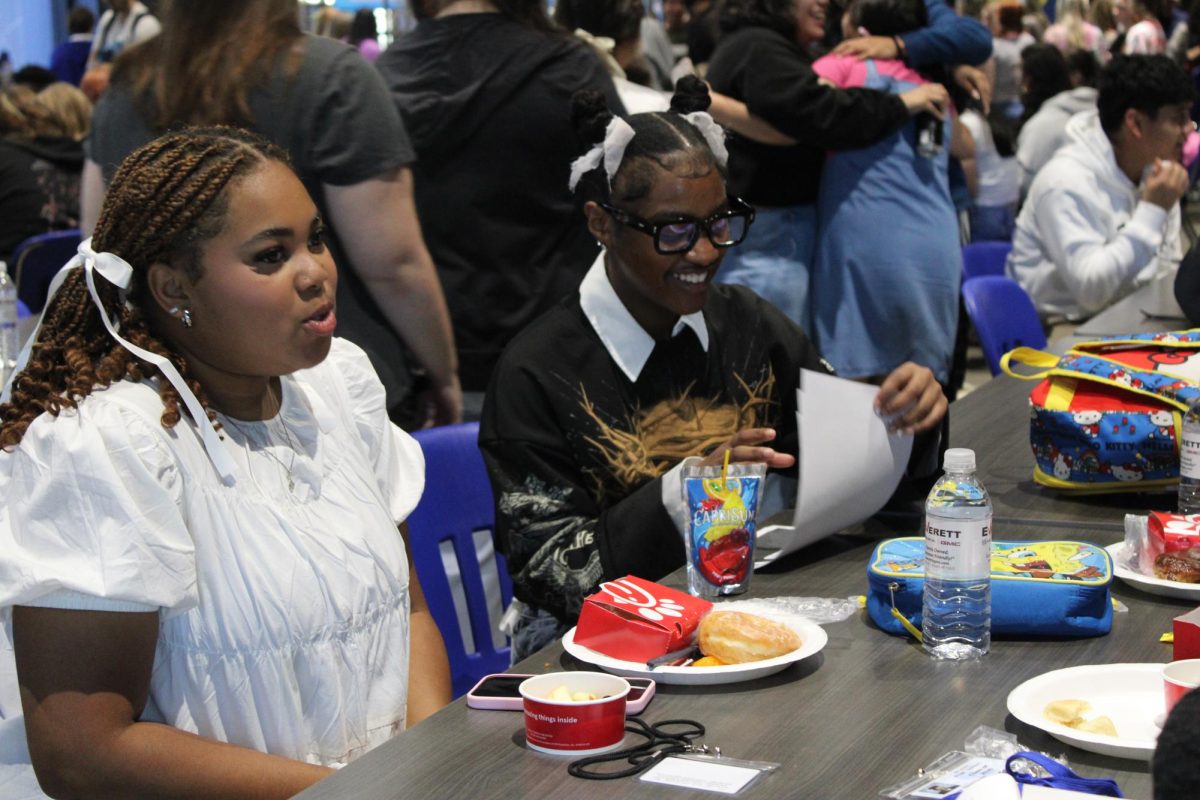Feminism is most often, if not always associated with women. The ideas and goals of feminists are usually seen as “too strong, too aggressive, isolating, anti-men and unattractive.”
“The word itself conjures up women picketing and grabbing the microphone and yelling, saying how bad men have been throughout time,” English teacher Lucas Nossaman said. “I don’t think that’s accurate to what the term involves.”
The United Nations General Assembly created the United Nations Entity for Gender Equality and the Empowerment of Women (UN Women) in July 2010. The main goal of this organization is to lead and coordinate the UN system’s work on gender equality as well as promote accountability.
“I think it’s still very much an issue, even though we like to kid ourselves into thinking it’s a thing of the past,” Nossaman said. “I think there’s truth in saying that women have been overlooked in history, and that’s unfortunate.”
But it’s not just women who are stereotyped or imprisoned by society’s definition.
On September 20, 2014, UN Women met at the United Nations Headquarters in New York to launch a campaign called HeForShe.
HeForShe is “a solidarity movement for gender equality that brings together one half of humanity in support of the other half of humanity, for the benefit of all.”
Actress and UN Women Goodwill Ambassador Emma Watson spoke at this event and out of every speech given that day, hers stood out, not only to the audience, but also to many news sources covering the event. Weeks after, her speech was still circulating the Internet and being featured on many Twitter feeds.
Watson said their goal was to galvanize as many men and boys as possible to be advocates for gender equality. This is the first campaign of its kind at the UN, and Watson said that they will strive to not only make people aware of this issue, but also “make sure it is tangible.” Watson’s speech was full of personal experiences and her reasons for participating in this movement, but she also addressed an aspect of gender equality most fail to consider: how men fit into feminism. She defined feminism as “the belief that men and women should have equal rights and opportunities. It is the theory of the political, economic and social equality of the sexes.”
This campaign fights for women and men alike and believes that for men and women to be equal, all must be seen as the same. Women must be allowed to be strong and sexy. Men must be allowed to be sensitive and stable. The HeForShe movement stands for the belief that both genders need to be seen on a spectrum not as two opposing sets of ideas.
Senior Tanner Hopps said he sees discrimination against women in things like wages and opportunities offered, and also sees discrimination against men in things like court cases about alimony, child support and reproductive rights. He said the problem with campaigns for gender equality is the labeling. By calling the campaign the HeForShe, he said he thinks they point to one specific group of people and exclude the rest.
“The fact that you have to call them the men’s rights or feminist movement is very counterproductive because you’re setting up an assertive mentality just by sectioning yourself off like that. That’s why I consider myself an egalitarian, which believes in equality for all people, all races, all genders, all sexual orientations,” Hopps said.
Watson touched on this concern during her speech for the campaign by saying that it is “not about men saving women.” She called it “an equality club for both genders.”
“We have groups specializing in different areas right now, but for everyone to see that this is an issue, I think we have to eliminate gender as a whole. Equality is equality, and you can’t judge it based on what race you are, what sexuality you are, or just what type of person you are. We can’t hold grudges; we can’t hold animosity to anyone that’s ever wronged us,” Hopps said. “As soon as everyone eliminates all the factors from the conversation, that’s when we’ll actually get people behind and on board.”
Hopps and Nossaman both said that their school days had a big influence on their ideas of feminism and gender roles. Nossaman said he had a few encounters with “inadvertent feminists” similar to the ones Watson referenced.
“In high school, I was around all the athletes, and I enjoyed playing soccer, but I started to realize that I also enjoyed reading and writing. That was because I had a male English teacher; I had never had that before. He opened my eyes to how you can be a man and still enjoy emotional things like literature and writing,” he said.
Nossaman said he saw the female side of feminism in college when he was majoring in English.
“There aren’t that many men who are English majors, so I was around a lot of women who impressed me with their ideas and intelligence, and in my graduate studies, reading a lot more by women and seeing their perspective,” he said.
Hopps said he sees the influence in a slightly different light.
“I think the biggest problem is in school because that’s where every body learns who they are. I think when you have a thing like ‘man up,’ I think that’s where we go wrong. When you force someone into a gender role, you stunt their development,” Hopps said.
In middle school, Hopps said he was made fun of or teased for wearing vibrant colors and expressing his views that were, at the time, not seen as “manly.”
“I would be called gay and metro sexual and things like that for wearing vibrant clothes and knowing how to dress myself well. Regardless of that being joking or not, any sort of judgment based on arbitrary guidelines is going to stop some one from being who they really are,” Hopps said.
For students like senior Emily Hunt, feminism means more than gender roles and equal rights; it’s about treating others as equals.
“A lot of people say that feminism is getting rid of gentility, and I don’t think that’s necessarily true. Women can pay for the date and women can open doors, but that doesn’t mean that men have to be less of a gentlemen. I think doing stuff like that should be something that everybody does, regardless of your gender because it’s basic kindness,” Hunt said.
Nossaman said that for him, it means listening to his wife and adjusting to the idea of women in untraditional roles and professions.
“It starts with me not assuming that a man can do a certain role better than a woman. With the thing about Hilary Clinton perhaps running for president, that takes some getting use to for me. And that really has caused me to think about why that would be weird for me,” Nossaman said. “So I’ve had some good conversations with my wife, and I think I’ve come to a better understanding.”
Like A Girl is another movement that is similar to HeForShe, but focuses more on empowering girls and boosting their confidence. It launched June 26, 2014, by the brand Always through a commercial during the Super Bowl. This commercial highlighted the phrase ‘like a girl’ by asking people what it meant to run like a girl or throw like a girl in hopes of changing ‘like a girl’ from an insult into a compliment.
Movements like HeForShe and Like A Girl are working to raise awareness and get more people involved in bringing about the end of this issue. They look to make big changes in the world and as fast as they can, but Nossaman said he believes the best way to help this issue is to start small.
“I’m a little skeptical of making sure that we have an equal amount of men and women in each work place. I think that’s a little silly, but I think it starts with personally asking yourself, Am I being bias? Am I assuming that a man could do this well and a women couldn’t do think just as well?” Nossaman said.
Junior Kynlee Cunningham said that being a girl occasionally makes her feel as though she is looked down upon or seen as less than the boys around her. Most of all, she said she felt discouraged, knowing that men sometimes make more than women in the same work force, but the only way to make things better is to raise awareness.
“Whenever someone says something to you and you feel offended by it, we tend to just ignore it. That doesn’t help the problem at all. Sometimes we just let it happen because we figure one person can’t make a difference, but everyone can make a difference if you just stand up for yourself,” Cunningham said.







